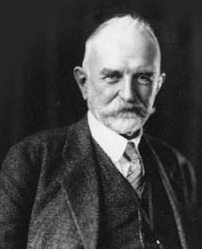George Herbert Mead
American philosopher, sociologist, and psychologist

George Herbert Mead (February 27, 1863 – April 26, 1931) was an American philosopher, sociologist, and psychologist, primarily affiliated with the University of Chicago. He is considered one of the founders of pragmatism and a key figure in the development of social psychology.
Early life and education[edit]
Mead was born in South Hadley, Massachusetts, to a religious family. His father, Hiram Mead, was a minister, and his mother, Elizabeth Storrs Billings Mead, was a devoutly religious woman. Mead attended Oberlin College and graduated in 1883. He later studied at Harvard University, where he was influenced by the work of William James and Josiah Royce.
Academic career[edit]
In 1894, Mead joined the faculty at the University of Chicago, where he remained for the rest of his career. At Chicago, Mead worked alongside other prominent figures such as John Dewey, with whom he shared many intellectual interests. Mead's work focused on the development of the self and the role of communication in social life.
Philosophical contributions[edit]
Mead is best known for his theory of the social self, which he developed in his seminal work, Mind, Self, and Society. According to Mead, the self emerges from social interactions and is not present at birth. He argued that the self is a product of social processes and is shaped by the individual's interactions with others.
The "I" and the "Me"[edit]
Mead introduced the concepts of the "I" and the "Me" to explain the dual nature of the self. The "I" represents the individual's spontaneous and autonomous response to the social environment, while the "Me" represents the internalized attitudes and expectations of others. The interplay between the "I" and the "Me" forms the basis of self-consciousness and personal identity.
Symbolic interactionism[edit]
Mead's work laid the foundation for the development of symbolic interactionism, a major theoretical perspective in sociology. Symbolic interactionism emphasizes the role of symbols and language in the formation of the self and society. It focuses on how individuals create and interpret meanings through social interactions.
Legacy[edit]
Mead's ideas have had a profound impact on the fields of sociology, psychology, and philosophy. His work on the social self and symbolic interactionism continues to influence contemporary research and theory. Mead's emphasis on the importance of communication and social interaction in the development of the self remains a central theme in social psychology.
Related pages[edit]
Ad. Transform your life with W8MD's Budget GLP-1 injections from $75


W8MD offers a medical weight loss program to lose weight in Philadelphia. Our physician-supervised medical weight loss provides:
- Weight loss injections in NYC (generic and brand names):
- Zepbound / Mounjaro, Wegovy / Ozempic, Saxenda
- Most insurances accepted or discounted self-pay rates. We will obtain insurance prior authorizations if needed.
- Generic GLP1 weight loss injections from $75 for the starting dose.
- Also offer prescription weight loss medications including Phentermine, Qsymia, Diethylpropion, Contrave etc.
NYC weight loss doctor appointmentsNYC weight loss doctor appointments
Start your NYC weight loss journey today at our NYC medical weight loss and Philadelphia medical weight loss clinics.
- Call 718-946-5500 to lose weight in NYC or for medical weight loss in Philadelphia 215-676-2334.
- Tags:NYC medical weight loss, Philadelphia lose weight Zepbound NYC, Budget GLP1 weight loss injections, Wegovy Philadelphia, Wegovy NYC, Philadelphia medical weight loss, Brookly weight loss and Wegovy NYC
|
WikiMD's Wellness Encyclopedia |
| Let Food Be Thy Medicine Medicine Thy Food - Hippocrates |
Medical Disclaimer: WikiMD is not a substitute for professional medical advice. The information on WikiMD is provided as an information resource only, may be incorrect, outdated or misleading, and is not to be used or relied on for any diagnostic or treatment purposes. Please consult your health care provider before making any healthcare decisions or for guidance about a specific medical condition. WikiMD expressly disclaims responsibility, and shall have no liability, for any damages, loss, injury, or liability whatsoever suffered as a result of your reliance on the information contained in this site. By visiting this site you agree to the foregoing terms and conditions, which may from time to time be changed or supplemented by WikiMD. If you do not agree to the foregoing terms and conditions, you should not enter or use this site. See full disclaimer.
Credits:Most images are courtesy of Wikimedia commons, and templates, categories Wikipedia, licensed under CC BY SA or similar.
Translate this page: - East Asian
中文,
日本,
한국어,
South Asian
हिन्दी,
தமிழ்,
తెలుగు,
Urdu,
ಕನ್ನಡ,
Southeast Asian
Indonesian,
Vietnamese,
Thai,
မြန်မာဘာသာ,
বাংলা
European
español,
Deutsch,
français,
Greek,
português do Brasil,
polski,
română,
русский,
Nederlands,
norsk,
svenska,
suomi,
Italian
Middle Eastern & African
عربى,
Turkish,
Persian,
Hebrew,
Afrikaans,
isiZulu,
Kiswahili,
Other
Bulgarian,
Hungarian,
Czech,
Swedish,
മലയാളം,
मराठी,
ਪੰਜਾਬੀ,
ગુજરાતી,
Portuguese,
Ukrainian